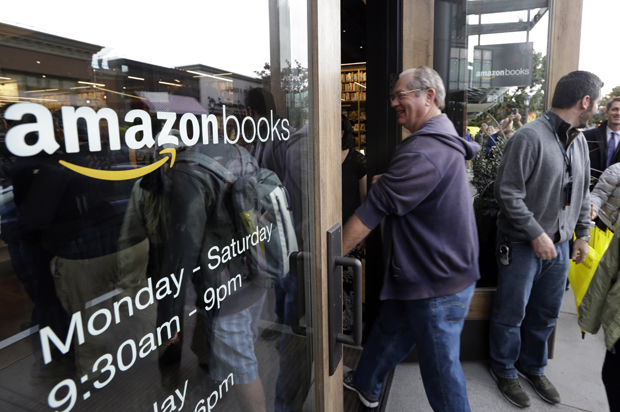Amazon is apparently slated to open hundreds of new stores around the country. “After dipping its toes into brick-and-mortar retailing last year with its first physical bookstore, online giant Amazon.com Inc. is poised to dive into the deep end,” The Wall Street Journal reports. The company may open as many as 400 new stores, inspired by its first bookshop, in Seattle. (More here.)
If you only buy your books at the mall, this may seem like good news. If you are self-published author, it may help you in the short term. But like just about everything in the digital economy, it’s a mixed blessing at best, and a touch totalitarian at worst if Amazon sticks to the method it uses in its Seattle store.
The original location opened to a combination of expectation and confusion in November: Why was the corporation that taught buyers to avoid the bookstore now opening one? Rob Salkowitz of Forbes figured out what the move really about: Amazon barely makes money selling books. What it’s best at is collecting data on customers.
To get the price, you scan the code with the camera of your smartphone and the Amazon app. If you don’t have a smartphone or the app installed, an associate can do it for you. This brings up the product page for the item you’re looking at, with full reviews, specs and pricing. Pretty slick, eh?
But here’s where it gets interesting. If you are signed into the app with your account – as is likely – Amazon is immediately able to associate its online customer records with you, the customer browsing the shelves in its physical location. It knows your preferences, your buying history, your status as an Amazon Prime and/or Amazon credit card member, and who knows what else. Armed with that data, it can feed you recommendations, offer coupons and incentives, and do whatever it needs to do to close the sale as you are holding an item in your hand that you are considering purchasing.
Cue Philip K. Dick reference.
In some cities and neighborhoods, this will make shopping for books more convenient. But the problem with Amazon was never that it wasn’t convenient – it was that it was removing human beings from bookselling, and becoming a corporate bully or some version of a monopoly. It put independent bookstores out of business, destroyed Borders, sliced and diced Barnes & Noble, and was able to tell publishers what to do as well. These days, Amazon is testing drones overseas.
Amazon now controls something like half of the books sold in the United States. And the slight rise in independent bookstores over the last few years is precarious: It’s mostly taken place because of the fall of superstores. Four hundred more Amazon outlets does not sound like good news to any existing store, chain or independent. The fewer players in the game, the more power Amazon has to do whatever it wants. What could that mean?
Look at what’s happened to Uber. The rideshare service recently cut its rates and reduced what it pays its drivers. A protest is expected at the Super Bowl, which could involve 9,000 drivers in San Francisco and Los Angeles tangling up freeways. A new story in The Observer describes the plans:
“We’re telling them we’re going to shut it down for the Super Bowl. We’re shutting it down. We’re shutting the highways down. We’re shutting everything down and we’re not going to allow Uber to keep screwing drivers over,” Mario, who organized the caravan he said consisted of 1,000 drivers, said in a video recorded by RideShare Report’s Mike Dean at the protest. He declined to give his last name.
Many of the drivers are now making less than minimum wage. But at least for now, they can make some noise about their plight.
When Amazon decides to change what it pays self-published writers, how do they mobilize to fight it? And with its apps and algorithms, what will keep Amazon from removing human beings from its stores entirely, except for a security guard or two? If Amazon becomes the only game in town – and knows as much about you as the NSA does — just about everyone else loses.

